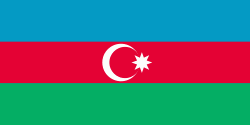Hüsülü (Gyusyulyu)
Husulu (Hüsülü), historically also known as Kashataghk (Քաշաթաղք) is a village in the Lachin District of Azerbaijan, located close to the villages of Malıbəy (Melikashen), Qarıqışlaq (Tandzut) and Ağoğlan.
Armenian monuments such as the Tsitsernavank Monastery from between the 5th and 7th centuries, and the 15th-century Melik Haykaz Palace are located near the village.
Most Armenian historians identify the village with Kashataghk, a settlement mentioned by the 13th-century Armenian historian Stephen Orbelian (one Armenian historian, Armen Gharagyozian, instead identifies Kashataghk with the nearby village of Qarıqışlaq). Despite the village's small size and population, the whole region of Kashatagh was named after this settlement due to it being a princely residence of the Armenian Meliks of Kashatagh.
The Kurdish population that settled in the Kashatagh region after the deportation of the Armenian population from the region by Shah Abbas I referred to the village as Sultankand; according to historian Samvel Karapetyan, this is because the inhabitants knew about the location's past as a princely residence. The name has also been rendered as Sultanlar and Sultanlı.
Under the rule of the Russian Empire, the settlement was administered as part of the Zangezur Uyezd of the Elisabethpol Governorate. During the Soviet period, the village was part of Red Kurdistan until its abolition in 1929. Thereafter, it was administered as part of the Lachin District. In 1931, the village received its current name, after the Azerbaijani communist official Hüsü Hajiyev.
The village was located in the Armenian-occupied territories surrounding Nagorno-Karabakh, coming under the control of ethnic Armenian forces during the First Nagorno-Karabakh War in the early 1990s. The village subsequently became part of the breakaway Republic of Artsakh as part of its Kashatagh Province, where it was known as Tsitsernavank (Ծիծեռնավանք), with the Tsitsernavank community including the village of Melikashen (Մելիքաշեն). It was returned to Azerbaijan as part of the 2020 Nagorno-Karabakh ceasefire agreement.
Armenian monuments such as the Tsitsernavank Monastery from between the 5th and 7th centuries, and the 15th-century Melik Haykaz Palace are located near the village.
Most Armenian historians identify the village with Kashataghk, a settlement mentioned by the 13th-century Armenian historian Stephen Orbelian (one Armenian historian, Armen Gharagyozian, instead identifies Kashataghk with the nearby village of Qarıqışlaq). Despite the village's small size and population, the whole region of Kashatagh was named after this settlement due to it being a princely residence of the Armenian Meliks of Kashatagh.
The Kurdish population that settled in the Kashatagh region after the deportation of the Armenian population from the region by Shah Abbas I referred to the village as Sultankand; according to historian Samvel Karapetyan, this is because the inhabitants knew about the location's past as a princely residence. The name has also been rendered as Sultanlar and Sultanlı.
Under the rule of the Russian Empire, the settlement was administered as part of the Zangezur Uyezd of the Elisabethpol Governorate. During the Soviet period, the village was part of Red Kurdistan until its abolition in 1929. Thereafter, it was administered as part of the Lachin District. In 1931, the village received its current name, after the Azerbaijani communist official Hüsü Hajiyev.
The village was located in the Armenian-occupied territories surrounding Nagorno-Karabakh, coming under the control of ethnic Armenian forces during the First Nagorno-Karabakh War in the early 1990s. The village subsequently became part of the breakaway Republic of Artsakh as part of its Kashatagh Province, where it was known as Tsitsernavank (Ծիծեռնավանք), with the Tsitsernavank community including the village of Melikashen (Մելիքաշեն). It was returned to Azerbaijan as part of the 2020 Nagorno-Karabakh ceasefire agreement.
Map - Hüsülü (Gyusyulyu)
Map
Country - Azerbaijan
 |
 |
| Flag of Azerbaijan | |
The Azerbaijan Democratic Republic proclaimed its independence from the Transcaucasian Democratic Federative Republic in 1918 and became the first secular democratic Muslim-majority state. In 1920, the country was incorporated into the Soviet Union as the Azerbaijan SSR. The modern Republic of Azerbaijan proclaimed its independence on 30 August 1991, shortly before the dissolution of the Soviet Union in the same year. In September 1991, the ethnic Armenian majority of the Nagorno-Karabakh region formed the self-proclaimed Republic of Artsakh. The region and seven surrounding districts are internationally recognized as part of Azerbaijan pending a solution to the status of the Nagorno-Karabakh through negotiations facilitated by the OSCE, although became de facto independent with the end of the First Nagorno-Karabakh War in 1994. Following the Second Nagorno-Karabakh War in 2020, the seven districts and parts of Nagorno-Karabakh were returned to Azerbaijani control.
Currency / Language
| ISO | Currency | Symbol | Significant figures |
|---|---|---|---|
| AZN | Azerbaijani manat | ₼ | 2 |
| ISO | Language |
|---|---|
| HY | Armenian language |
| AZ | Azerbaijani language |
| RU | Russian language |















